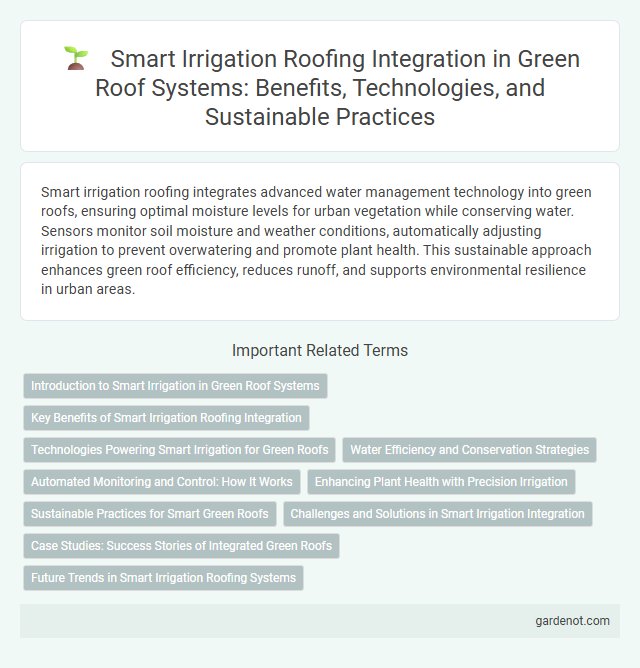Smart irrigation roofing integrates advanced water management technology into green roofs, ensuring optimal moisture levels for urban vegetation while conserving water. Sensors monitor soil moisture and weather conditions, automatically adjusting irrigation to prevent overwatering and promote plant health. This sustainable approach enhances green roof efficiency, reduces runoff, and supports environmental resilience in urban areas.
Introduction to Smart Irrigation in Green Roof Systems
Smart irrigation in green roof systems integrates advanced sensors and automated controls to optimize water usage, enhancing plant health while conserving resources. These systems use real-time data on soil moisture, weather conditions, and evapotranspiration rates to adjust watering schedules precisely. Implementing smart irrigation reduces water waste by up to 40%, supports sustainable urban landscaping, and contributes to the overall efficiency of green infrastructure.
Key Benefits of Smart Irrigation Roofing Integration
Smart irrigation roofing enhances water efficiency by using sensors and automated systems to deliver precise moisture levels, reducing water waste significantly. This technology promotes healthier plant growth on green roofs, improving air quality and thermal insulation while minimizing maintenance costs. Integrating smart irrigation systems supports sustainability goals by conserving water resources and extending the lifespan of roofing materials.
Technologies Powering Smart Irrigation for Green Roofs
Smart irrigation systems for green roofs utilize sensor technology, including soil moisture sensors and weather stations, to optimize water use and enhance plant health. Advanced controllers analyze real-time data to automate watering schedules, reducing water waste and improving efficiency. Integration of IoT devices and AI-driven algorithms enables adaptive irrigation tailored to microclimates on rooftop gardens, promoting sustainability and resilience.
Water Efficiency and Conservation Strategies
Smart irrigation roofing utilizes advanced sensors and AI-driven systems to optimize water use, significantly reducing runoff and evaporation. These technologies monitor soil moisture and weather patterns in real-time, enabling precise water delivery that conserves resources and promotes plant health. Implementing smart irrigation on green roofs supports sustainable water management while enhancing rooftop vegetation resilience.
Automated Monitoring and Control: How It Works
Smart irrigation roofing utilizes sensors to continuously monitor soil moisture levels, temperature, and weather conditions, ensuring precise water application. Automated control systems process real-time data to activate irrigation only when necessary, optimizing water usage and promoting plant health. These technologies reduce water waste and maintenance efforts, enhancing sustainability in green roof management.
Enhancing Plant Health with Precision Irrigation
Smart irrigation roofing uses advanced sensors and automated water delivery systems to optimize moisture levels precisely for each plant type, promoting healthier growth and reducing water waste. By monitoring soil conditions and weather patterns in real-time, these systems adjust irrigation schedules to meet specific plant needs, boosting overall rooftop garden productivity. Precision irrigation technology enhances plant resilience and longevity, making green roofs more sustainable and vibrant throughout all seasons.
Sustainable Practices for Smart Green Roofs
Smart irrigation systems optimize water use on green roofs by employing sensors that monitor soil moisture and weather conditions, ensuring precise watering schedules that reduce waste. Integrating rainwater harvesting technologies further enhances sustainability by utilizing natural resources without relying on municipal water supplies. These sustainable practices contribute to energy savings, prolong plant health, and support urban biodiversity on smart green roofs.
Challenges and Solutions in Smart Irrigation Integration
Smart irrigation integration on green roofs faces challenges such as sensor calibration difficulties, uneven water distribution, and system maintenance under variable weather conditions. Solutions involve deploying advanced soil moisture sensors, implementing drip irrigation technology for targeted watering, and utilizing IoT-based monitoring systems to optimize water usage and ensure plant health. These innovations enhance water efficiency, reduce runoff, and support sustainable urban greenery.
Case Studies: Success Stories of Integrated Green Roofs
Case studies of smart irrigation roofing demonstrate significant water savings and enhanced plant health on integrated green roofs, with systems using soil moisture sensors and automated drip irrigation. Notable projects like the Chicago City Hall green roof reduced water usage by 40% while improving thermal insulation and biodiversity. These success stories highlight the effectiveness of technology-driven irrigation in promoting sustainable urban landscapes and reducing building energy costs.
Future Trends in Smart Irrigation Roofing Systems
Future trends in smart irrigation roofing systems emphasize the integration of IoT sensors and AI-driven analytics to optimize water usage based on real-time weather data and plant health monitoring. Advanced materials with moisture retention technology combined with autonomous irrigation controls enhance sustainability and reduce maintenance needs in green roof installations. Innovations in predictive algorithms and remote management platforms enable precise irrigation scheduling, significantly improving water efficiency and promoting eco-friendly urban development.
Smart irrigation roofing Infographic

 gardenot.com
gardenot.com